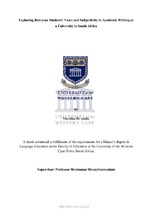Exploring first-year Students’ Voice and Subjectivity in Academic Writing at a University in South Africa
Abstract
Literacy development in South African higher education is increasingly challenged by several issues in dialogue and language of tuition. Despite the widening of access to South African universities, research shows that a large majority of entry-level university students are still failing in their chosen programme of studies. Almost all universities in the democratic South Africa incorporate academic development programs in first-year modules as an awareness raising attempt to scaffold novice students into the vocabulary of their various disciplines. However, these development programs sometimes fail to address the language needs of some of the students who have had more than seven years of schooling in their first languages (IsiXhosa and Afrikaans). My study seeks to explore how additional language IsiXhosa and Afrikaans students understand and construct written knowledge in one literacy development course using English medium of instruction. I further explore lecturers’ and tutors’ perspectives of the demand of sounding a scholarly voice in academic writing by entry-level students in their new roles as scholars in the University of the Western Cape (UWC).Literature indicated gaps when it comes to students’ and lectures’ perceptions on the construction of voice in academic writing in a language that the students are not comfortable in.

